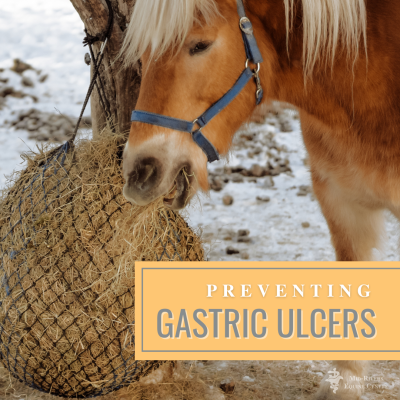 The presence of gastric ulcers in horses is astronomical. Estimates of 60% of horses and upwards of 90% of racehorses suffer ulcers. The condition decreases performance, invites poor behavior, and is painful. Here are a few tips to reduce the development of gastric ulcers.
The presence of gastric ulcers in horses is astronomical. Estimates of 60% of horses and upwards of 90% of racehorses suffer ulcers. The condition decreases performance, invites poor behavior, and is painful. Here are a few tips to reduce the development of gastric ulcers.
Tips to Help Prevent Gastric Ulcers
- SLOW FEEDER: Saliva helps buffer stomach acid protecting the delicate lining. A slow feeder will increase saliva production offering more hours of protection.
- PASTURE TIME: Increase the amount of time a horse spends on pasture. Like a slow feeder, grazing increases saliva production, increasing protection against ulcers.
- ALFALFA BEFORE EXERCISE: Alfafa contains buffering properties, and feeding it before exercise when acid splashes into the unprotected upper stomach will help protect against acidic damage.
- FRIENDS: Stable a horse prone to ulcers in a location where they can see their barn mates. Not feeling alone can reduce stress and ultimately reduce ulcer production.
- OMEPRAZOLE: With your primary care veterinarian’s supervision, give a preventative omeprazole dose before stressful situations (traveling, showing). The smaller dosage help makes it an affordable choice.
- ANTI-INFLAMMATORY OPTIONS: Nonsteroidal anti-inflammatory medications (Bute, Banamine) can contribute to ulcer production or complications. Discuss newer drug options with your primary care veterinarians.
Suspect your horse has ulcers? Read Signs A Horse Has Gastric Ulcers